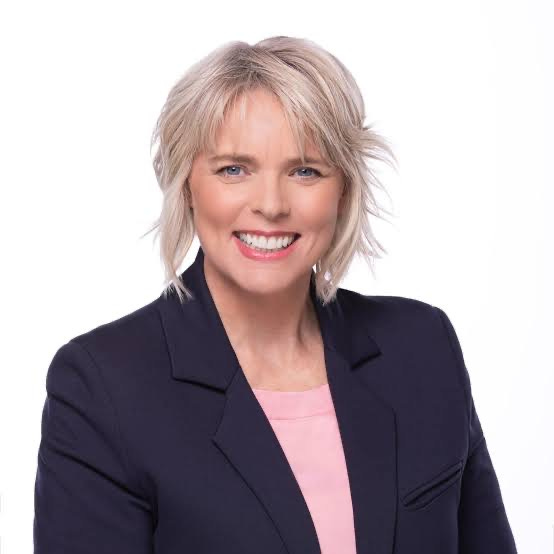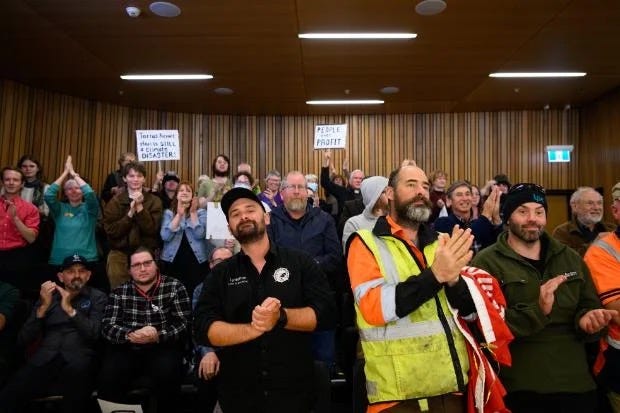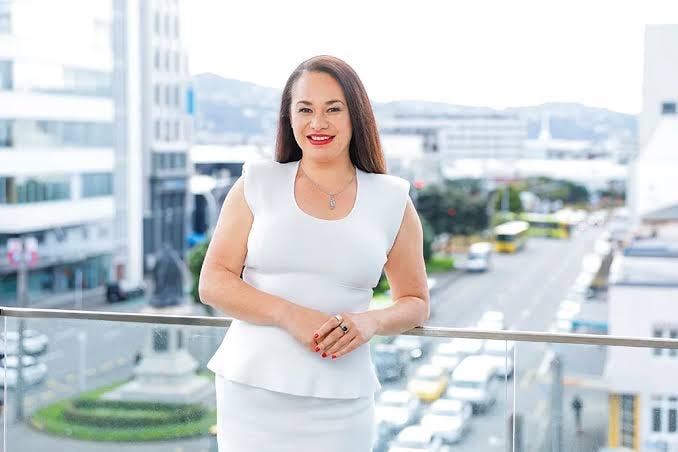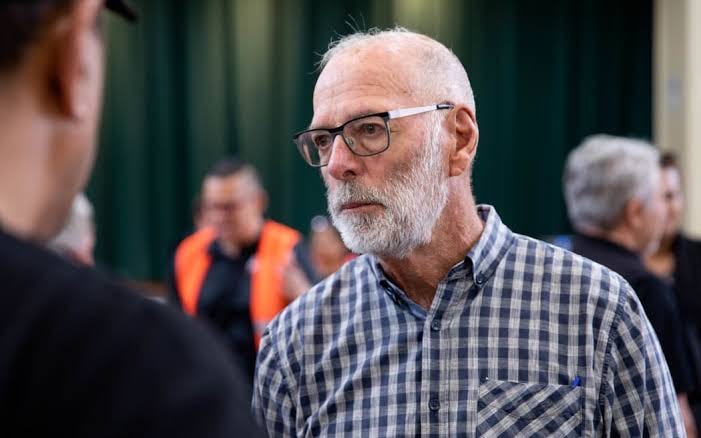The right have a stupid saying that is only occasionally true:
When is democracy not democracy? When it hasn’t been voted on.
While not true in regards to branches of government such as the judiciary, it’s a philosophy that probably should apply to recently-elected local government councillors.
Nevertheless, this concept seemed to escape Cr Victoria Henstock, who described the council’s decision to block exploration of asset sales (spontaneously proposed early into the term despite no councillors campaigning on them in their recent elections) as undemocratic, a statement that stretches the definition of “representative democracy” to its very limits.
However, councillor Victoria Henstock branded the decision “undemocratic” and said it “defied logic” not to carry out due diligence.
She repeatedly mentioned the additional $450m in additional dividends and the value that would offer the city.
Her speech was met with boos and jeers from the crowd, with one person yelling out that she was “twisting things”.
Someone’s been taking lessons from David Seymour.
The councillors who were suddenly in favour of asset sales were exactly the ones you would expect: the ones on the right.
Cr Aaron Keown echoed Henstock’s concerns.
He said he wanted to let democracy speak and let the other 400,000 people of Christchurch not in the council chamber have their say.
It’s just a pity Keown didn’t let them have their say on it when he was running for councillor for his upteenthmillion term.
Christchurch residents are not alone in having their councillors attempting to mine their coffers unexpectedly.
In Wellington, they’ve faced a similar divide over asset sales. What happened here, however, was that left-wing Mayor Tory Whanau led the development of a long term plan for the city that would fix Wellington water and improve citywide services without having to resort to austerity measures that would further cripple the city, something austerity is economically known to do, especially when heading into a recession.
Every city is facing a choice between rate rises and austerity in order to keep their water assets up to scratch after the new National government got into power and scrapped Labour’s commitment to taking over these assets and the massive burden of costs attached to them. Every city, that is, except for Wellington, which is facing painful austerity measures ON TOP OF an 18.6% rate rise.
In order to fix Wellington Water as promised during her campaign, Whanau has come up with a plan to fund it by selling the city’s minority stake in Wellington Airport — with no controlling share, the strategic importance of the airport ownership was not as significant as for other city councils, and Wellington’s location and situation makes insuring the airport particularly expensive, an unsurprising reality given their earthquake risk, weather, and coastal position.
But like in Christchurch, this sale was not campaigned on.
This has posed a serious moral quandary for the left wing councillors, especially the Greens who, like Whanau, also do not want austerity, but who believe strongly in retaining local government assets. Unlike Whanau, their personal reputation has not been staked on fixing Wellington water, and so several have preferred to retain assets for their city over the surety of funding their long term plan.
By tying the LTP to the airport, huge delays to its passing have been achieved. Simeon Brown also opportunistically used this democratic discord to undermine Whanau’s governance and install a Crown observer. This was after the council narrowly avoided crown intervention in the passing of their budget back in June.
Councillors this month have locked in the long term plan, with Cr Calvert unsuccessfully attempting to reduce rates rises to under 10%.
Simeon Brown is another politician who seems to misunderstand the concept of democracy, taking it upon himself to limit the decisions councils are allowed to make for their constituents, floating the idea of rates pegging to limit rate rises and instructing them around what he expects them to be spending their money on.
This attitude has come under opposition from a number of mayors, with some in smaller districts pointing out that they already spend over 90% of their budget on roading and water. This must make the insult sting all the more, when it is the decision of this government that has left the cost of water infrastructure and the higher debt servicing costs squarely on their shoulders.
But Brown has found a likely ally in Auckland Mayor Wayne Brown, no relation — although they do seem pretty chummy. Just look at how well they worked together in their drive to kill off Auckland light rail and blacklist civic engineers for daring to work on a project they disapprove of.
Text Message: “Good work on ALR [Auckland Light Rail], what about harbour crossing study, even more money wasted, we need a published list of consultants and how much they got so they can be blacklisted, Wayne.” [sign off]
Wayne Brown at least campaigned on his policy of excruciating austerity. And he’s keeping his promise. Since his election, he has got to work cutting councillor lunches, Citizens Advice Bureau funding, ANZAC Day Parades, social programmes, pest traps, native plants, event agencies, and urban regeneration organisations, just to name a few. Some of these changes involve organisations like Auckland Transport which are being brought back under council control, something Wayne Brown attributes to democracy:
This shakeup, announced just before Christmas, threatens to bring to Auckland what Luxon brought to Wellington when he carved his budget money out of the pockets of the Capital’s primarily-government-employed workers, initiating a localised recession that he then used as an excuse to order them to return to the office.
Browns cuts will have a much smaller impact, but like the rest of the country, Auckland faces an economy deep in a 3-year long recession government austerity has already worsened. Rising unemployment threatens to continue this sluggish spending — and if electricity prices spike again, we could see more closures as they struggle to weather this extended period of higher costs and lower profits. Limiting council spend limits money that would otherwise flow into the local economy and can worsen this cycle.
Simeon Brown’s approval is still required for the Council to return AT functions to their own control, but quite fortunately for Wayne, he’s seemingly very on board. Amongst the other organisations returning to Council are Auckland Zoo and Auckland Art Gallery, as well as some theatres and stadiums.
Wayne Brown also threw a jab at film and tourism support, saying there was “a fine line between public good and private benefit,” and that they too needed greater scrutiny and “democratic accountability”, indicating their time too — like their funding — may be limited.
Such a chummy relationship between local and central government must be the envy of many others. Dunedin Mayor Jules Radich could only dream of such co-operation from his Minister of Personal Bugbears, Dr Shane Reti, who has cancelled Dunedin’s hospital build due to wanting to see public healthcare fail so his private companies can profit.
This nuclear-level threat to Otago’s health has kept the mayor quite busy events like with 35,000-strong protests and ambulance publicity stunts.
Reti’s reticence to fund health has seemingly left Radich with little time to pursue other causes, barring one: his unitary plan to bring Dunedin’s regional neighbours into the fold and unite everyone under one greater Otago council. A bit like Auckland’s supercity merger, but without the supercity.
Radich fortunately got to cast the deciding vote on this when the council was brought to an even split over progressing this, despite some councillors worrying that just the proposal would offend their neighbouring districts, straining further an already-tense relationship.
One of these tense relationships is with Gore mayor Ben Bell, who’s found himself managing quite a number of them since being elected to office. The city’s first ever gay mayor, he overcome a homophobic outing during his campaign by the former mayor’s PR person, only to find himself upon inauguration locked into local government’s most disharmonious marriage with CEO Stephen Parry, who refused to work with Bell and also, frustratingly, refused to leave.
This caused something of a constitutional crisis that no one seemed to know how to resolve, and Bell later claimed that he considered resigning during this. Although the press rightly pointed out that the democratic outcome was that Parry should step aside for the region’s newly-elected mayor, Parry managed to cling on like a limpet for over half of Ben Bell’s term, finally exiting earlier this year and leaving Bell with the world’s most contradictory party invitation:
The maturity is unparalleled.
Ben Bell’s run for mayor may have been motivated by a deeper issue within the council, as it was revealed his mum was actually a former council employee who left after a dispute. Bell was certainly an up-and-comer in the mayoralty race; like Whanau’s appointment, his win was taken as an indication the region wanted change.
In another similarity to Whanau, his decisions around staffing have faced excessive scrutiny. Whereas Whanau ran through a roster of PR people, Ben Bell started his term in office by being denied a dedicated executive assistant. This was reported on widely — but not as widely as when his former PA, who had apparently assisted him for just one council meeting, was convicted of forging scripts for tramadol (and was supported in court by Ben Bell’s mother).
Gore faces rates rises of 40%, a figure cut down to just over 20% in April this year. The council is almost at its debt ceiling and has no assets from which to draw income, only rates. With only 7000 people in the rural district, that leaves them stumping up more for the higher costs of services.
Meanwhile Bell faces strong pushback from pressure groups Groundswell and Federated Farmers over an initiative to include Ngai Tahu cultural values in the district plan.
In their response, Groundswell incidentally acknowledge the entire cause of this cultural and political rift that grips New Zealand right now, describing the move as “another smoke and mirrors attack on property rights”.
The struggle Bell faces in his leadership speaks to the heart of the conflict as he attempts to respect indigenous values, facilitate relationships with tangata whenua and implement sustainability measures, all of which can impact the property rights of landholders and so to which many of Gore’s land-owning farmers strenuously object.
Like many other left-wing mayors, Bell finds himself managing a semi-hostile council as well as an overstretched council budget that the right are weaponising against him, with Groundswell and Federated Farmers describing the council as going “woke and broke” over their attempts to work with iwi, strongly linking the council’s debt issues with its progressive cultural initiatives.
It has become a very familiar pattern
Nga mihi and thank you for reading.
If you’d like to support my work, until Christmas, I will have 75% off subscriptions (forever). The koha is hugely appreciated.













🤔 This govt has done many infuriating things, and interfering in Local govt is one that winds me up as much as anything. We vote for our local govt reps to make decisions based on local issues & not only do we get to vote them out or back in next time, but we see them around the place & can interact at public meetings etc. (Christchurch broadcast many on-line) Unless there is obvious dysfunction, central govt should stay out of it, but even that is fraught with "who decides" questions⁉️ If they are going to hand over a portion of GST to local govt then I would accept such funds being ring-fenced for say water infrastructure or whatever, but if a community WANTS bike lanes & other such things, it is no business of central govt what OUR rates are spent on. No system is perfect, but with this coalition it is pot-calling-kettle black on steroids, plus imposing their ideology which we didn't vote for locally.
Very interesting for those living adjacent to Wellington…